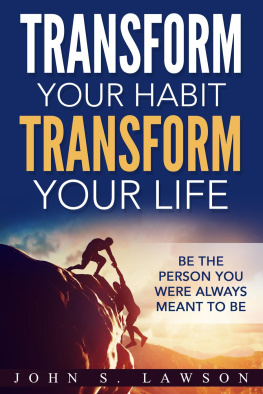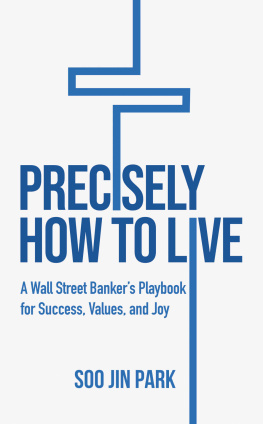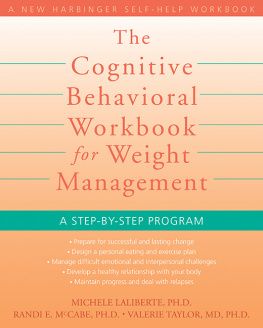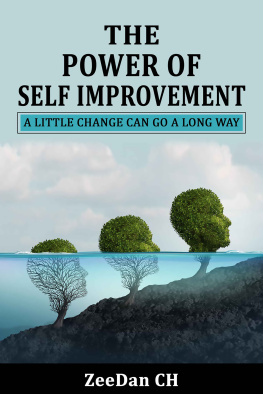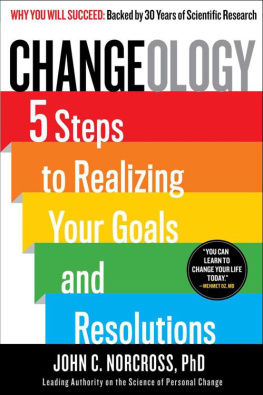I ts late at night as I head up the steep drive to my parents house, the house I grew up in. Im just off the plane from New York, and as soon as I cut the engine on my rental car I can hear the crickets chirping in the warm California night. My long day of travel at an end, I let my head fall back against the seat and I listen for a moment. Im home.
An outside light illuminates the pathway to the front door; inside, the house is dark, my parents asleep. I roll my bag along the pebbled path and slip inside. Im thirsty, hungry, and tired; my plane was two hours late getting in. But I dont stop for a glass of water or to check whats in the fridge. I go straight to the pantry, open the door, and hang up my car keys on an old brass rack where two other key rings dangle in the dark.
Becoming a licensed driver is a rite of passage in the California suburbs, where you cant really get anywhere without a car. I counted the days to my sixteenth birthday and couldnt wait to get behind the wheel. I learned to hang up the car keys as soon as I came home on the day I passed my driving testover twenty-five years ago. My new California drivers license meant there would now be three drivers sharing two cars. Keys hidden in purses or pants pockets or tossed onto a bureau meant frustration and lost time. Hang up the keys! my parents would shout as soon as I stepped in the door.
But tonight Ive arrived in a rental car only I am authorized to drive. My parents each have a car parked in the driveway. We arent going to share cars, so why hang up the keys? Why beeline for the hook in the dark?
The answer holds the secret to achieving continuous and sustainable self-improvement. If only I had known the answer all those years ago, every one of my resolutions since would have succeeded.
Introduction: Why Resolutions Fail
I will lose weight.
I will be neat.
I will be on time.
I will get out of debt.
I will be thin by summer.
I will get ahead at work.
I will be more loving.
I will be assertive.
I will get in shape.
I will get organized.
I will quit smoking.
I wont be defensive.
I will be a better person.
W hy is it so hard to keep our resolutions? We begin with enthusiasm and determination, yet our will falters and our resolutions fizzle. And every time we break a resolutiona promise we make ourselves to improve our liveswe feel demoralized, powerless to make progress and realize our goals.
Even highly disciplined and successful individualswinnersfail at self-improvement initiatives. Were all losers when it comes to the New Years resolution, our collective failure rate a spectacular 88 percent. We run in place like hamsters on a wheel, renewing and forsaking the same resolutions in an annual cycle, telling ourselves that if we only had more resolve, more willpower, more character, we could force a breakthrough to a better self. We begin each year (or birthday or season or Monday morning) with fresh determination, muster our willpower, tweak our resolutions, and try again. Over time, the pattern of making and breaking resolutions becomes familiar and demoralizing. We go on making resolutions, but we expect to fail.
What if instead of failing annually at our New Years resolutions, we made strategic and targeted resolutions year-round that were guaranteed to succeed and transform us permanently? What if our resolutions brought us immediate rewards, raised our self-awareness, and energized our self-improvement efforts? What if every time we made a resolution we actually expected to succeed?
Small Move, Big Change is about making resolutions that succeed every time. By rethinking will power, and refocusing your resolutions, you can master the art of instant and sustainable self-improvement, achieving personal goals that once seemed out of reach. Transparent successes will take the place of mystifying failures, optimism will replace hopelessness, confidence will replace helplessness. You will learn how to succeed instead of fail; indeed, you will learn to expect success.
The purpose of this book is to teach you how to translate broad personal goals into microresolutions that can be managed, measured, and kept. A microresolution is a compact and powerful commitment designed to nail a precise behavioral target exactly and deliver benefits immediately. Rather than suffering a collapse of willpower after weeks of exhausting effort, you will learn how to overpower your objective through strategic focus and targeted self-control. Your resolutions will pay off the day you start and are sustainable for a lifetime. Microresolutions succeed in every self-improvement category, whether your goal is losing weight, improving a relationship, or saving money.
For most of my life I lived the common experience in resolution makingI failed nearly all the time. These personal failures were a mystery to me, as I was very successful in my career on Wall Street and in nurturing a happy and rewarding family life. I put in long hours running a global department numbering nearly five hundred people, meeting demanding deadlines, and coaching careers; I was devoted to my family, to the needs of my young daughter, husband, and aging parents; I was engaged in charities and active in my community. But despite my capacity to deliver for others and the take-no-prisoners attitude I brought to the most challenging career assignments, I struggled to keep the personal commitments I made to myself, from going to the gym regularly to spending more time with my family. With all my energy and determination, I wondered why my resolutions had succeeded only a handful of times.
Finally, after a particularly painful resolution flop, I tried something different. I assigned myself a small but meaningful behavioral changea microresolutionand I succeeded in changing myself immediately and permanently. Yet it was only after succeeding at several more microresolutions modeled on the first that I realized I had stumbled onto a method for making targeted commitments that succeeded virtually every time. I began reaching goals that had been years deferred: I lost weight and got in shape; I became tidier and better organized; I improved my relationships and my finances. Excited by my progress, I began to share my system with business colleagues, friends, and family who in turn passed the system on to others. My thriving test lab led me to a simple conclusion:








